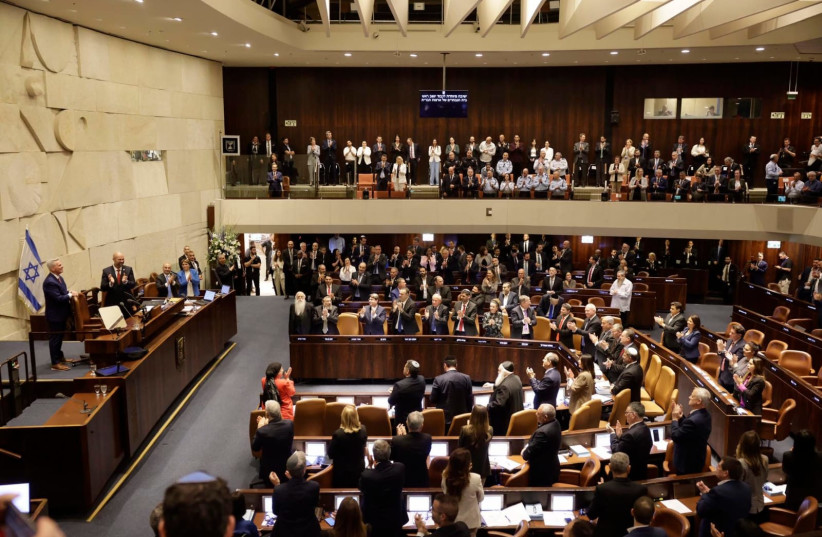‘The day after” preoccupies international diplomacy and challenges commentators around the world. Countless articles and position papers have laid out action guidelines that address the question of how to move forward after the war ends.
Some questions, however, mask false assumptions that frustrate analysis and render any recommendations derived from it moot. Such is the case with the dangerous conclusion that initiating an Israeli-Palestinian political process should wait until “the day after” the war. We may find that waiting too long precludes the chances of ever reaching an end to the conflict.
The expectations and emotions stirred up by the phrase “the day after” cloud its meaning. Arik Einstein’s hopeful words in his “Song After the War” are on the lips of many Israelis. We want to believe that a comforting light awaits us at the end of the dark tunnel, and that it will wake us from this nightmare and put our lives back on track.
But the war in Gaza can be expected to disappoint those who hang their hopes on “the day after.” Even if that day is ceremoniously announced, it will not necessarily mark the end of the bloodshed.
What will be in store the day after the war ends?
Politicians are known to break promises, but the reality is different this time. An Israeli government that does not act to eradicate Hamas, will eradicate itself. The spin doctors will find it impossible to “engineer” the public consciousness and convince us that “we won.” The test of victory is in the world of facts: if the residents of the South do not return to their homes, we will not have won.
It will take the IDF a long time to restore a sense of security to those traumatized families. Even when the Hamas government collapses and its top leaders are eliminated, it will still be necessary to deal with the brushfires of its vestiges. The fighting will continue to fall on the shoulders of the IDF.
Many governments, in the region and outside of it, support the annihilation of Hamas, but they have no appetite for endangering their own soldiers to that end. Moreover, will those displaced from the South return to their homes if their children’s safety relies on an international force?
The imperative imposed on the Israeli government to destroy Hamas and the fact that Israel cannot entrust this task to foreign hands will not lead us to a brand new “day after” but to the reoccupation of the Gaza Strip. As the occupation becomes more advanced, fewer tanks will maneuver through the Strip and the fighting will become less intense, but terrorism will not disappear, and we will continue to bleed into the mud of the Gaza quagmire.
Israel’s friends around the globe assume that this grim reality will force the nation to contend with the strategic dilemma of how to tackle the conflict between us and the Palestinians. They yearn to see us opt for the two-state solution over a continuing occupation, which can only lead to a binational reality and the forfeiture of Israel’s Jewish and democratic character.
Alas, a severe disappointment awaits these friends. Today, no significant Israeli leader stands in ideological opposition to the right-wing concept of unending occupation. The convenient excuse is that we have to wait for “the day after” the war, but waiting exacts a heavy price:
• As an occupying power, Israel may find itself responsible for the fate of two million Palestinians living in misery in the devastated Gaza Strip. Countries willing to invest the necessary billions for its reconstruction are already conditioning their contributions on an Israeli commitment to a political process that will lead to a two-state solution. They insist on not financing the Israeli occupation.
• Israel is treading a dangerous path toward conflict with the United States. US President Joe Biden has voiced his opposition to the reoccupation of Gaza and the necessity of moving toward a two-state solution. Annexation adherents praying for a Trump victory in the November 2024 elections should refresh their memory: the vision of the establishment of a Palestinian state where the West Bank and Gaza are connected as one entity, is at the heart of Trump’s “deal of the century.”
• Postponing moves that lead to a political settlement grants additional time to the expansion of the settlement enterprise. Eventually, division of the land will no longer be possible, and Israelis will find themselves condemned to live in a violent binational state that has lost its Jewish character.
• A political settlement is the biggest threat to Hamas. In order to defeat the idea that gave rise to the horrors of October 7th, a competing idea must be advanced. A reliable horizon of Palestinian independence will gradually erode the attraction of the Hamas ideology and strengthen the Palestinian camp that supports a historic compromise with Israel.
• The fight against the threat of the radical Islam espoused by Iran requires the establishment of a regional front.
Only a reliable Israeli commitment to the two-state solution will allow the US to establish such an alliance, which will also be key in reaching peace agreements with Saudi Arabia and other countries in the Arab and Muslim world.
Israel has a huge interest in not waiting for “the day after” and should declare its commitment to a two-state solution right now. But it lacks leaders who will openly admit this truth and work tirelessly to convince the Israeli public of its necessity. Unfortunately, we have just one desperate hope left: a new government that, despite its fear of taking the initiative on its own, will be smart enough to yield to external pressures that insist on a path toward political settlement.
The writer, a former director-general of the Foreign Ministry, is a senior fellow at the Jewish People Policy Institute (JPPI). His novel Toronto Junction was published this year by 2sfarim Publishing.

